- Home
- Quizzes
- My Quiz Activity
- Newsletters
- Sports Betting
- MY FAVORITES
- Add Sports/Teams
- SPORTS
-
NFL
- NFL Home
- Arizona Cardinals
- Atlanta Falcons
- Baltimore Ravens
- Buffalo Bills
- Carolina Panthers
- Chicago Bears
- Cincinnati Bengals
- Cleveland Browns
- Dallas Cowboys
- Denver Broncos
- Detroit Lions
- Green Bay Packers
- Houston Texans
- Indianapolis Colts
- Jacksonville Jaguars
- Kansas City Chiefs
- Las Vegas Raiders
- Los Angeles Chargers
- Los Angeles Rams
- Miami Dolphins
- Minnesota Vikings
- New England Patriots
- New Orleans Saints
- New York Jets
- New York Giants
- Philadelphia Eagles
- Pittsburgh Steelers
- San Francisco 49ers
- Seattle Seahawks
- Tampa Bay Buccaneers
- Tennessee Titans
- Washington Commanders
-
MLB
- MLB Home
- Arizona Diamondbacks
- Atlanta Braves
- Baltimore Orioles
- Boston Red Sox
- Chicago White Sox
- Chicago Cubs
- Cincinnati Reds
- Cleveland Guardians
- Colorado Rockies
- Detroit Tigers
- Houston Astros
- Kansas City Royals
- Los Angeles Angels
- Los Angeles Dodgers
- Miami Marlins
- Milwaukee Brewers
- Minnesota Twins
- New York Yankees
- New York Mets
- Oakland Athletics
- Philadelphia Phillies
- Pittsburgh Pirates
- San Diego Padres
- San Francisco Giants
- Seattle Mariners
- St. Louis Cardinals
- Tampa Bay Rays
- Texas Rangers
- Toronto Blue Jays
- Washington Nationals
-
NBA
- NBA Home
- Atlanta Hawks
- Boston Celtics
- Brooklyn Nets
- Charlotte Hornets
- Chicago Bulls
- Cleveland Cavaliers
- Dallas Mavericks
- Denver Nuggets
- Detroit Pistons
- Golden State Warriors
- Houston Rockets
- Indiana Pacers
- Los Angeles Clippers
- Los Angeles Lakers
- Memphis Grizzlies
- Miami Heat
- Milwaukee Bucks
- Minnesota Timberwolves
- New Orleans Pelicans
- New York Knicks
- Oklahoma City Thunder
- Orlando Magic
- Philadelphia 76ers
- Phoenix Suns
- Portland Trail Blazers
- Sacramento Kings
- San Antonio Spurs
- Toronto Raptors
- Utah Jazz
- Washington Wizards
-
NHL
- NHL Home
- Anaheim Ducks
- Arizona Coyotes
- Boston Bruins
- Buffalo Sabres
- Calgary Flames
- Carolina Hurricanes
- Chicago Blackhawks
- Colorado Avalanche
- Columbus Blue Jackets
- Dallas Stars
- Detroit Red Wings
- Edmonton Oilers
- Florida Panthers
- Los Angeles Kings
- Minnesota Wild
- Montreal Canadiens
- Nashville Predators
- New Jersey Devils
- New York Islanders
- New York Rangers
- Ottawa Senators
- Philadelphia Flyers
- Pittsburgh Penguins
- San Jose Sharks
- Seattle Kraken
- St. Louis Blues
- Tampa Bay Lightning
- Toronto Maple Leafs
- Vancouver Canucks
- Vegas Golden Knights
- Washington Capitals
- Winnipeg Jets
- NCAAF
- NCAAM
- Boxing
- Entertainment
- Lifestyle
- Golf
- MMA
- Soccer
- Tennis
- Wrestling
- More Sports
- RESOURCES
- My Account
- YB on Facebook
- YB on Twitter
- YB on Flipboard
- Contact Us
- Privacy Policy
- Terms of Service

There is nothing less cinematic than the process of writing. It's a solitary, sedentary profession. You sit at a desk, you stare at the word processor of your choosing and you churn out copy. Sometimes you have the luxury of waiting for inspiration to strike; other times, you've got a deadline to hit, and you live with whatever spills from your brain to your fingertips. But what comes in between knocking out your novel or screenplay or article or what have you can be fairly interesting. Also, stumbling across the inspiration to your magnum opus can be a story in itself. Here are twenty-five films that truly, acutely, painfully capture the agony and fleeting ecstasy of being a writer.
"Wonder Boys"
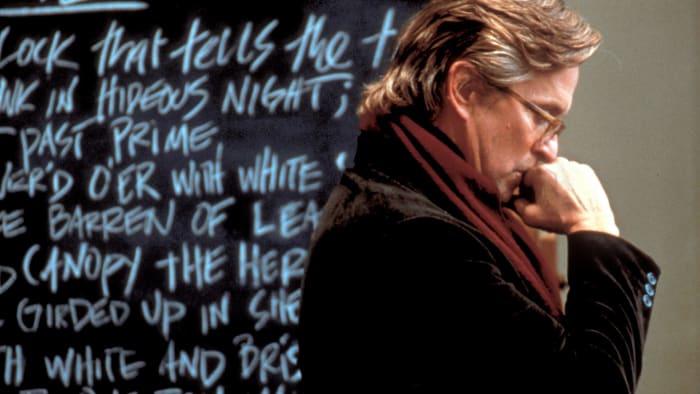
It’s been years since Grady Tripp (Michael Douglas) published his celebrated first novel, and his long-awaited follow-up isn’t coming easily to him. It’s not a matter of writer’s block: He’s written over 2,000 pages while teaching creative writing at a prestigious Pennsylvania college. What’s stymying him is the ending. And while he doesn’t know where the terminus is, he does know he’s still a long way from it. Curtis Hanson’s superb adaptation of Michael Chabon’s own second novel should be painfully familiar to anyone who’s tackled a long-form piece of writing. It’s funny and wise about the process, and the supporting cast (which includes Tobey Maguire, Frances McDormand, Rip Torn and Robert Downey Jr.) gives it extra zip.
"The Shining"
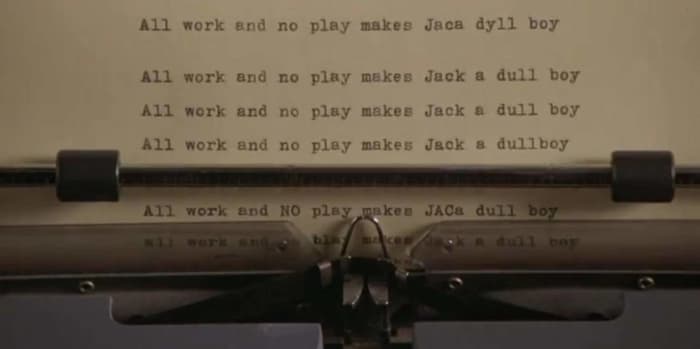
Jack Torrance (Jack Nicholson) thinks he’s found a situation conducive to productive creative writing. He’s holed up for the winter in a sprawling, mostly empty hotel nestled in the Colorado Rockies with his wife (Shelley Duvall) and son (Danny Lloyd). It’s an author’s paradise! Alas, the hotel has a history (a former caretaker went crazy and murdered his family), and Torrance, a recovering alcoholic, can’t muster more than a single sentence (“All work and no play makes Jack a dull boy), which he writes over and over. That’s probably not going to sell. Perhaps realizing this, Jack goes crazy and tries to murder his family. On one hand, he’s doing something proactive, which is a good way to alleviate writer’s block; on the other, he freezes to death, which is a major impediment to finishing.
"Some Came Running"

Many of the films on this list depict writers as self-destructive types (primarily because a content-and-sober writer is not the stuff of interesting cinema), and you won’t find a better, more heartbreaking examination of an artist near the end of his tether than this Vincente Minnelli adaptation of James Jones’s novel. Frank Sinatra stars as Dave Hirsh, a twice-published author and World War II veteran who has spent his post-combat years in a drunken fog. He returns to his hometown of Parkman, Indiana, where he falls for a schoolteacher (Martha Hyer) who admires his work and encourages him to resume his writing career. Dave also falls in with a heavy-drinking gambler (Dean Martin) and a goodhearted, yet unrefined woman (Shirley MacLaine) who encourage his worst tendencies. It’s a marvelous film.
"Adaptation."

“I’m hungry. I should get coffee. Coffee would help me think.” Nicolas Cage plays a fictionalized version of screenwriter Charlie Kaufman (and his entirely fictional twin brother, Donald) in this deeply meta film about the scribe’s real-life struggle to adapt Susan Orlean’s “The Orchid Thief." Kaufman’s screenplay is the most brutally honest take on the writing process ever put to film; from the horror of the blank page to the myriad tangents that are so far off the mark they have no business making the final draft, it’s creative failure transformed into an explosively imaginative masterpiece. And now that Kaufman’s done it to perfection, no one can do it again! (Though Kaufman took many a liberty with his stunningly expansive adaptation of Iain Reid's "I'm Thinking of Ending Things".)
"An Angel at My Table"
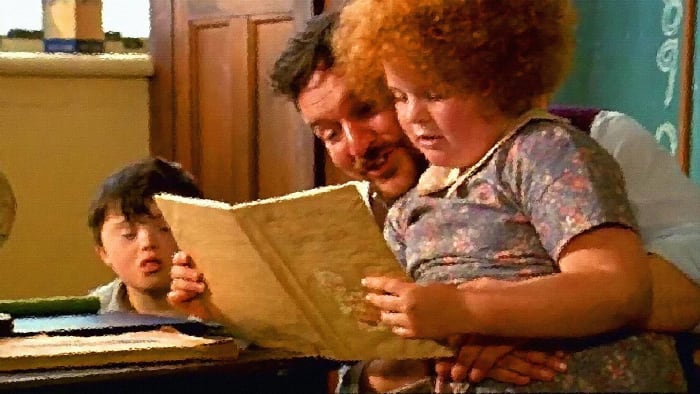
“I have made up my mind not to be a teacher. I am going to be a poet.” Jane Campion’s adaptation of Jane Frame’s memoirs is alternately harrowing and enchanting portrait of the artist as a profoundly misunderstood young woman. Tracking Frame’s life from birth to awkward adolescence to hospitalization (she was misdiagnosed as schizophrenic and nearly lobotomized) to eventual success, Campion conjures the inner life of a born writer whose vibrant creativity was viewed as a sickness. While Frame’s struggles were clearly due to cultural attitudes toward female creativity, the film plays as a vindication for misfits. Eccentrics like Frame are a gift to the world.
"Barton Fink"
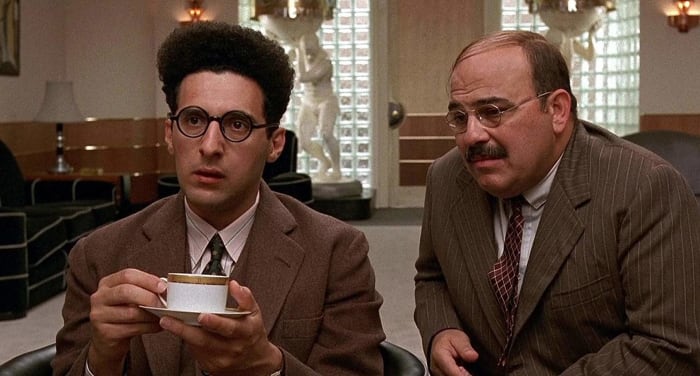
Joel and Ethan Coen famously hatched the idea for “Barton Fink” while struggling with the densely plotted “Miller’s Crossing." Their protagonist (John Turturro) is a self-important ‘40s playwright in the Clifford Odets mold. He comes to Hollywood to write a wrestling picture, and, laboring to make sense of his task, seeks counsel from a legendary writer (John Mahoney) clearly based on William Faulkner. The Coens puncture myths about the screenwriting profession by depicting two celebrated authors from different mediums going mad or drinking themselves to death (while signing their name to others’ work). This industry doesn’t tolerate individuality; they just want the work to get done.
"Henry Fool"

Hal Hartley’s characteristically absurd comedy stars Thomas Jay Ryan as an alcoholic, would-be novelist who strikes up a friendship with an introverted garbage man (James Urbaniak) who’s inexplicably written “the great American poem." The two friends complement each other perfectly: Ryan has the tortured genius part down pat but isn’t much in the talent department, while Urbaniak is an asocial loser with an untapped gift for verse. Hartley’s off-center sensibilities and unpredictable storytelling come together brilliantly in this oddly touching meditation on creativity. It’s his finest work to date, and one of the best films of the 1990s.
"My Brilliant Career"

Gillian Anderson’s adaptation of Miles Franklin’s novel about a rural Australian woman (Judy Davis) whose artistic ambitions are discouraged by her family is a celebration of personal and creative independence. Davis’ character fends off advances from potential courters (Sam Neill and Frank Hawdon) as she strives to establish herself as a professional writer, which, given the tale’s turn-of-the-century setting, is akin to landing on the moon. It’s an entrancing, empowering film driven by a sensational Davis.
"Almost Famous"
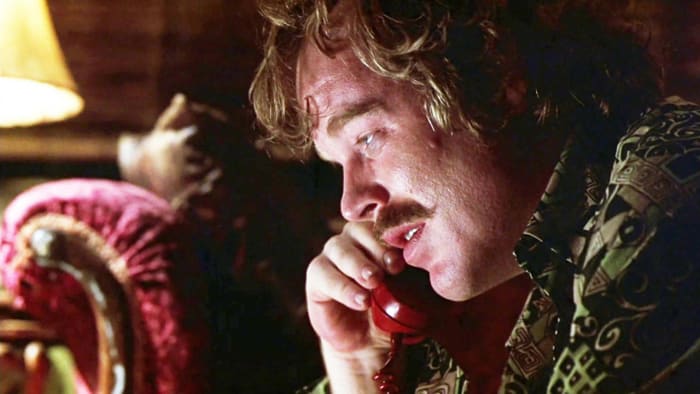
The hero of Cameron Crowe’s semiautobiographical drama is a precocious 15-year-old music journalist (Patrick Fugit) who hits the road with an on-the-rise rock band, but the heart of the film is Philip Seymour Hoffman’s portrayal of legendary rock critic, Lester Bangs, who serves as the younger writer’s mentor. If you’ve ever worked in the journalism sphere, you know that Bangs’ advice about assuaging the concerns of editors is pretty much gospel, but he’s also insightful on the profession’s pitfalls (“You cannot make friends with rock stars”) and simply getting by in this pitiless existence. (“The only true currency in this bankrupt world is what you share with someone else when you’re uncool.")
"Sunset Blvd."

Billy Wilder’s classic opens with the film’s narrator and protagonist, Joe Gillis (William Holden), floating dead in a pool. Of course he’s a screenwriter, and of course he’s a sap who came to a bad end by trying to appease a delusional movie star. Wilder’s script (written with Charles Brackett and D.M. Marshman Jr.) is as cynical a view of Hollywood as you’ll ever read. Norma Desmond (Gloria Swanson), a former silent movie star who’s out to pasture at the age of 50, is ostensibly the villain of the piece, but her vanity is wholly understandable. One day she was an icon, the next she’s unemployable. “I am big," she exclaims. "It’s the pictures that got small.” Gillis is using her to ignite his own floundering career, and, it can be argued, gets what he deserves.
"Can You Ever Forgive Me?"

You could actually view Marielle Heller’s adaptation of Lee Israel’s autobiographical “Can You Ever Forgive Me?” as a darkly inspiring tale of a struggling author who reignites her career by credibly forging (and selling) correspondences from great writers like Fanny Brice and Noël Coward. Melissa McCarthy is sensational as Israel, whose chicanery nearly landed her in the clink; she openly drinks on the job (which she loses) and berates the people who are in a position to help her. When things are going well, writers can be fiercely self-centered; when they're not going well... they may not turn to crime, but you might want to keep your distance.
"Before Sunset"

A decade after a brief encounter that changed their young lives, Jesse (Ethan Hawke) and Céline (Julie Delpy) reunite for another, far more condensed walk-and-talk that, lo and behold, sets their adult lives down a completely different path. This isn’t a film about writing per se, but it’s clear that Jesse owes his career to Céline, and the night they spent together in Vienna. Writers are the sum total of their life experiences regardless of genre (e.g. Tolkien’s Middle-earth grew out of World War I), and here we have the rare privilege of having experienced the most important 12 hours of Jesse’s life along with him. We can’t read his book, but we can certainly imagine the intense longing of his writing.
"Naked Lunch"

Two masters of dread meet in the despairing middle with this nightmarishly inventive film about a drug-addled exterminator (Peter Weller) who takes orders from a Mugwump and a sentient insect typewriter. Cronenberg isn’t adapting William S. Burroughs’ “Naked Lunch” so much as he’s adapting the author’s life, which was both marred and inspired by the accidental shooting of his wife (Judy Davis). It’s the best film about the Beat Generation writers to date, and, in a weird way, one of Cronenberg’s most personal efforts.
"American Splendor"

LeBron James may be the King of Cleveland, Ohio (despite hailing from Akron), but Harvey Pekar was and will forever be the indefatigable soul of the Lake Erie metropolis. If you’ve never read his confessional comic books, this idiosyncratic biopic by Shari Springer Berman and Robert Pulcini will make you want to devour every single one. Paul Giamatti captures Pekar’s quarrelsome nature and insatiable curiosity; he’s an inveterate consumer of culture who loves to share his observations about jazz and life in general in his writing. This is a tribute to an ordinary man who lived an extraordinarily peculiar life.
"In a Lonely Place"

Are there any cheery films about screenwriting? None worth watching. But if you’re looking for the darkest film about the least respected job in Hollywood, you should queue up this Nicholas Ray classic immediately. Humphrey Bogart stars as a bottoming-out scenarist who’s suspected in the murder of a coat-check girl (Martha Stewart). He takes up with an aspiring actress (Gloria Grahame), who briefly reinvigorates his creative juices. But Bogart’s bitterness has long ago curdled into violence, which at the very least makes him a lousy boyfriend and, at most, makes him seem awfully capable of homicide.
"Barfly"

The life of Charles Bukowski isn’t something one should aspire to, and the author, via this semi-autobiographical film that he wrote, would seem to agree. Mickey Rourke is suitably scuzzy as Bukowski’s alter ego, Henry Chinaski, a barely employable alcoholic who composes poetry and short stories in his spare time. Well, some of his spare time. Mostly, he hangs out at his local bar and goads the humorless bartender (Frank Stallone) into fistfights in the alley out back. He occasionally shacks up with a fellow drunk (Faye Dunaway) and sleeps with a slumming publisher (Alice Krige) who loves his writing. Throughout the film, Chinaski is on a quixotic quest to obtain some ineffable sort of inebriated honor. He attains it, then repairs to the back alley to, in all likelihood, get the stuffing kicked out of him again.
"Factotum"

“If you’re going to try, go all the way. Otherwise, don’t even start.” No one would call Charles Bukowski the greatest writer of the 20th century, but he was certainly one of the most perceptive writers on writing. Matt Dillon plays Henry Chinaski this time out, and he’s more of a grounded drunk than the one Mickey Rourke played in “Barfly." Again, the film isn’t about writing so much as a twisted kind of honor. Whereas Chinaski has seemingly found companionship at the end of Barbet Schroeder’s film, Brent Hamer’s variation leaves him blitzed, alone and happy. Alcohol aside, writers often live solitary lives, and this is as unvarnished a depiction of that type of existence as you’re likely to see.
"Shakespeare in Love"
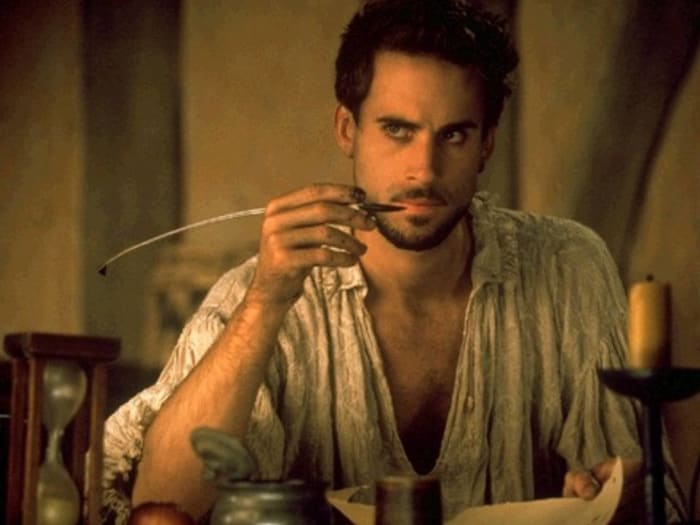
A buoyantly sentimentalized account of the writing of “Romeo and Juliet” initially written by Marc Norman, but inflamed with the Bard ardor of the great Tom Stoppard. The more you know Shakespeare, the better it plays, but it also works on a basic level as a mash note to the creative process. Joseph Fiennes’s playwright is a flustered romantic living in the shadow of his rival, Christopher Marlowe (Rupert Everett), but he discovers unexpected inspiration in the lovely Viola (Gwyneth Paltrow). Sometimes, all a writer needs is a swoon-worthy muse.
"The Whole Wide World"

Dan Ireland’s underseen gem about the unlikely romance between “Conan the Barbarian” creator Robert E. Howard (Vincent D’Onofrio) and schoolteacher Novalyne Price Ellis (Renée Zellweger) offers a disquieting view into the life of an artistic mind. Howard was an unusual young man: He was bound to his ill mother and lived vicariously through the brutal exploits of characters like Conan, Kull and Solomon Kane. And yet there’s a tenderness to his interactions with Ellis. The scenes in which we hear Howard raging as he writes his savage yarns are both alarming and touching. He’s in his universe, creating with abandon. Those stories found their audience and endure to this day. That he couldn’t bear to live beyond 30 is a horrible tragedy.
"Bright Star"

Jane Campion returned to the films-about-writing genre with this ode to poet John Keats (Ben Whishaw) and his muse, Fanny Brawne (Abbie Cornish). Given that Keats died from tuberculosis at the age of 25, he’s an easy figure to romanticize. But Campion, who also wrote the screenplay, portrays the writer as an insecure young man prone to jealousy. In humanizing Keats, his verse comes alive with a renewed vigor; it feels as though we’re hearing his work for the first time. It’s a testament to Campion’s passion and visual mastery that his tragically brief life story vibrates anew.
"Misery"

Stephen King is not only one of most prolific authors, he’s probably our most public reader (if you see him behind first base at Boston’s Fenway Park, he’s always got his nose buried in a book as the game unfolds around him). This voracious consumption of literature gets a cruel twist in his masterpiece “Misery”, which finds a successful pulp writer (James Caan) rescued from a car wreck by his “No, 1 fan” (Kathy Bates). She’s read all of his books, and, as luck would have it, he was en route with the manuscript for his latest novel. Unfortunately, this is the book in which the beloved main character dies, and that’s an ankle-shattering offense. They say never meet your heroes. Never, under any circumstances, meet your fans.
"Quills"

Philip Kaufman’s adaptation of Doug Wright’s play about the Marquis de Sade (Geoffrey Wright) is one of few films to depict a writer composing prose with his own filth. That’s an underused medium. It’s a brazen film that advocates freedom of expression and freedom of freakishness: Wright’s de Sade is a man of bizarre appetites, a hyper-sexualized Hannibal Lecter; for this to work, his worst offenses have been soft pedaled, but de Sade is such an ancient figure that this ahistorical portrayal isn’t terribly objectionable. De Sade is the monster we know. He writes exactly what he feels. The real danger comes from those in power who conceal their evil natures.
"Certified Copy"
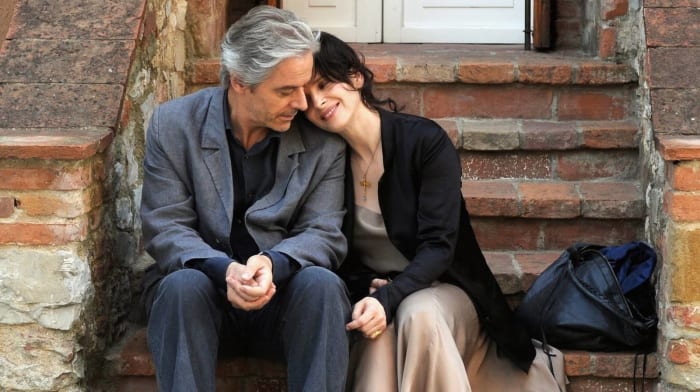
Abbas Kiarostami’s masterpiece is a divine drama about a writer (William Shimell) and an antiques dealer (Juliette Binoche) who engage in a daylong discussion regarding authenticity and reproduction. The film is about much more than the life of a writer, but Shimell’s arguments are integral to understanding how writers view the world; every word of every book ever written is a representation of the author’s reality (be it tangible or imagined). It’s a perspective. This may not sound like much of an epiphany, but as the film wears on, and the characters’ relationships to one another inexplicably bend, Kiarostami’s thesis throws everything that’s come before into doubt.
"The End of the Tour"

“He wants more than he has. I want precisely what he already has.” Whether James Ponsoldt’s “The End of the Tour” accurately portrays author David Foster Wallace, Donald Margulies’ screenplay and Jason Segel’s performance convey the cautious compassion of the great author’s work (primarily the greatest piece of writing of the 1990s, “Infinite Jest”). Wallace’s sparring partner is journalist David Lipsky, who probes the elusive genius for a comprehensive worldview and winds up in a lively debate about craft and humanity.
"Bullets Over Broadway"

John Cusack plays a Eugene O’Neill wannabe whose latest play, “God of Our Fathers”, is drastically improved via the startlingly brilliant input of a gangster’s right hand man (Chazz Palminteri). Written by Woody Allen and Douglas McGrath, “Bullets Over Broadway” is a backstage romp that, weirdly for Allen, champions collaboration. Maybe Allen had a silent partner on one of his classic comedies (aside from the credited Marshall Brickman), and this is his tribute to the unnamed hero of, who knows, “The Purple Rose of Cairo." In any event, it’s one of Woody’s best films and maybe his most generous.
Jeremy Smith is a freelance entertainment writer and the author of "George Clooney: Anatomy of an Actor". His second book, "When It Was Cool", is due out in 2021.
More must-reads:
- The 25 best movies and TV shows about the Middle Ages
- 23 films that were overlooked because of Barbenheimer
Trending in Entertainment
Customize Your Newsletter
 +
+
Get the latest news and rumors, customized to your favorite sports and teams. Emailed daily. Always free!
Use of this website (including any and all parts and
components) constitutes your acceptance of these
Terms of Service and Privacy Policy.

